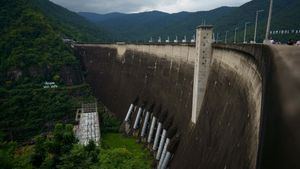The Arab League Council of Foreign Ministers convened its 152nd regular session on Tuesday in Cairo, focusing on pressing issues related to the Palestinian cause and regional stability. This meeting marks a significant step as it highlights the Arab League's commitment to addressing Israeli violations and supporting Palestinian sovereignty.
According to reports, the agenda for the council includes eight main items, four of which are directly concerning the Palestinian issue. Notably, the discussions will cover the recent Israeli actions in occupied territories, the funding challenges facing the United Nations Relief and Works Agency for Palestine Refugees (UNRWA), and the legal status of Palestinian refugees.
Muhannad Al-Akleek, the deputy ambassador of the Arab League, emphasized the gravity of the discussions, stating, "There will be paragraphs during the discussions highlighting the member states' determination to impose political, diplomatic, or economic punitive measures against any country recognizing Jerusalem as Israel's capital." This statement marks the first time member states are considering such measures, signifying the deepening political rift over the contentious status of Jerusalem.
The meeting's agenda reflects the Arab League's overarching goal of fostering unity among its members and reinforcing their collective stance on international issues affecting the Arab world. The ministers are expected to deliberate on the Israeli violations occurring within Jerusalem, particularly focusing on how these actions have escalated tensions and affected the day-to-day lives of Palestinians.
Prominent on the agenda is the renewal of UNRWA's mandate, which provides aid to Palestinian refugees. Al-Akleek mentioned, "We will also discuss renewing UNRWA's mandate for three more years and engaging with countries worldwide for broad support for its renewal." This highlights the importance of international cooperation and the investment necessary to sustain humanitarian efforts amid the broader political crises.
The Arab League members are also tasked with discussing the Palestinian call for financial aid. Specifically, the Palestinian Authority is seeking $100 million per month to support its budget amid rising economic challenges and political instability. Al-Akleek noted the significance of this financial support and expressed gratitude for the countries committed to aiding Palestine.
Beyond the Palestinian issue, the ministers will examine other regional conflicts, including those in Syria, Libya, and Yemen. They will also address territorial disputes involving the Gulf Islands of Greater and Lesser Tunb and Abu Musa, as well as the violation of Iraqi sovereignty by Turkish forces. The agenda reflects the Arab League's multifaceted approach to regional security, focusing not only on Palestine but on holistic strategies to combat threats to Arab nations.
With regard to international terrorism, the meeting will throw light on strategies to develop comprehensive plans to fight terrorism within the Arab world, reinforcing the League's commitment to preserving national security. This includes promoting peace and development efforts in conflict-affected areas such as Sudan and Somalia.
This council meeting arrives at a pivotal moment as it reaffirms Arab solidarity and the need for coordinated diplomatic efforts to navigate complex international landscapes. Analysts believe tangible outcomes from this meeting could set the stage for future initiatives and potentially reshape the political dynamics of the Arab world, especially concerning the Palestinian plight and regional stability.
By prioritizing the Palestinian cause, the Arab League demonstrates its dedication to not only addressing humanitarian needs but also taking significant political stances against perceived injustices. Whether through punitive measures against nations infringing on the Arab consensus or advocating for emergency financial aid for Palestine, the council's actions may influence future regional policies.
The decisions made during this session may have long-lasting repercussions for the Arab League's role on the international stage, their engagement with global powers, and the broader Arab community's approach to their shared challenges.



